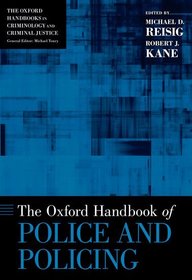
The Oxford Handbook of Police and Policing
Sorozatcím: Oxford Handbooks;
-
10% KEDVEZMÉNY?
- A kedvezmény csak az 'Értesítés a kedvenc témákról' hírlevelünk címzettjeinek rendeléseire érvényes.
- Kiadói listaár GBP 162.50
-
80 193 Ft (76 375 Ft + 5% áfa)
Az ár azért becsült, mert a rendelés pillanatában nem lehet pontosan tudni, hogy a beérkezéskor milyen lesz a forint árfolyama az adott termék eredeti devizájához képest. Ha a forint romlana, kissé többet, ha javulna, kissé kevesebbet kell majd fizetnie.
- Kedvezmény(ek) 10% (cc. 8 019 Ft off)
- Kedvezményes ár 72 174 Ft (68 738 Ft + 5% áfa)
Iratkozzon fel most és részesüljön kedvezőbb árainkból!
Feliratkozom
80 193 Ft

Beszerezhetőség
Megrendelésre a kiadó utánnyomja a könyvet. Rendelhető, de a szokásosnál kicsit lassabban érkezik meg.
Why don't you give exact delivery time?
A beszerzés időigényét az eddigi tapasztalatokra alapozva adjuk meg. Azért becsült, mert a terméket külföldről hozzuk be, így a kiadó kiszolgálásának pillanatnyi gyorsaságától is függ. A megadottnál gyorsabb és lassabb szállítás is elképzelhető, de mindent megteszünk, hogy Ön a lehető leghamarabb jusson hozzá a termékhez.
A termék adatai:
- Kiadó OUP USA
- Megjelenés dátuma 2014. május 15.
- ISBN 9780199843886
- Kötéstípus Keménykötés
- Terjedelem696 oldal
- Méret 180x249x55 mm
- Súly 1202 g
- Nyelv angol
- Illusztrációk 1 b/w line; 2 b/w halftone 0
Kategóriák
Rövid leírás:
The Oxford Handbook of Police and Policing brings together research on the development and operation of policing in the United States and elsewhere. Accomplished policing researchers Michael D. Reisig and Robert J. Kane have assembled a cast of renowned scholars to provide an authoritative and comprehensive overview of the institution of policing.
TöbbHosszú leírás:
The police are perhaps the most visible representation of government. They are charged with what has been characterized as an "impossible" mandate-control and prevent crime, keep the peace, provide public services-and do so within the constraints of democratic principles. The police are trusted to use deadly force when it is called for and are allowed access to our homes in cases of emergency. In fact, police departments are one of the few government agencies that can be mobilized by a simple phone call, 24 hours a day, 7 days a week. They are ubiquitous within our society, but their actions are often not well understood.
The Oxford Handbook of Police and Policing brings together research on the development and operation of policing in the United States and elsewhere. Accomplished policing researchers Michael D. Reisig and Robert J. Kane have assembled a cast of renowned scholars to provide an authoritative and comprehensive overview of the institution of policing. The different sections of the Handbook explore policing contexts, strategies, authority, and issues relating to race and ethnicity. The Handbook also includes reviews of the research methodologies used by policing scholars and considerations of the factors that will ultimately shape the future of policing, thus providing persuasive insights into why and how policing has developed, what it is today, and what to expect in the future.
Aimed at a wide audience of scholars and students in criminology and criminal justice, as well as police professionals, the Handbook serves as the definitive resource for information on this important institution.
Tartalomjegyzék:
List of Contributors
PART I: POLICING CONTEXTS
1. A Recent History of Police, James J. Willis
2. Policing Urban Drug Markets, Lallen Johnson
3. The Politics of Policing, John L. Worrall
4. Police Organizations and the Iron Cage of Rationality, Edward R. Maguire
PART II: POLICING STRATEGIES
5. Problem-Oriented Policing: Principles, Practice, and Crime Prevention, Anthony A. Braga
6. Order-Maintenance Policing, David Thacher
7. Community Policing, Gary Cordner
8. Zero Tolerance and Policing, Jack R. Greene
9. Policing Vulnerable Populations, Melissa Schaefer Morabito
PART III: POLICE AUTHORITY
10. Police Authority in Liberal Consent Democracies: A Case for Anti-Authoritarian Cops, Willem de Lint
11. Police Legitimacy, Justice Tankebe
12. Police Coercion, William Terrill
13. Restraint and Technology: Exploring Police Use of the TASER Through the Diffusion of Innovation Framework, Michael D. White
14. Police Misconduct, Sanja Kutnjak Ivkovich
PART IV: RACE/ETHNICITY AND POLICING
15. Police Race Relations, Ronald Weitzer
16. Race, Place, and Policing the Inner-City, Rod K. Brunson and Jacinta M. Gau
17. Racial Profiling, Robin Engel and Derek M. Cohen
18. Illegal Immigration and Local Policing, Melanie A. Taylor, Scott H. Decker, Doris M. Provine, Paul G. Lewis, and Monica W. Varsanyi
PART V: VARIETIES OF POLICE RESEARCH
19. Police Administrative Records as Social Science Data, Matthew J. Hickman
20. Using Community Surveys to Study Policing, Wesley G. Skogan
21. Systematic Social Observation of the Police, Robert E. Worden and Sarah J. McLean
22. Using Experimental Designs to Study Police Interventions, Lorraine Mazerolle, Cynthia Lum, and Anthony A. Braga
23. Ethnographies of Policing, Peter K. Manning
PART VI: POLICING INTO THE FUTURE
24. Police Legitimacy in Action: Lessons for Theory and Policy, Ben Bradford, Jonathan Jackson, and Mike Hough
25. Private Policing in Public Spaces, Alison Wakefield and Mark Button
26. The Policing of Space: New Realities, Old Dilemmas, Steve Herbert
27. Policing in Central and Eastern Europe: Past, Present, and Future Prospects, Gorazd Mesko, Andrej Sotlar, and Branko Lobnikar
28. Local Police and the "War" on Terrorism, Brian Forst
Index




